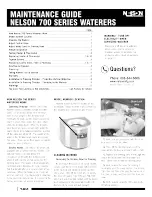
1A. Minimum sump size: 10” (254mm) diameter
by 10” (254mm) depth for vertical switch
models; 14” (356mm) diameter by 18”
(457mm) depth for tethered switch models.
1B. Construct the sump pit of tile, concrete, steel,
or plastic; it must meet code requirements.
1C. No clay, earth, sand, or gravel in the sump
(they will clog the pump). Keep the pump inlet
screen clear.
2A. Install the discharge plumbing and check
valve, using PTFE pipe thread sealant tape -
NOT pipe joint compound.
2B. Tighten the pipe into the pump (hand tight
+ 1-1/2 turns).
2C. Install a check valve in the vertical pipe to
prevent flow backwards through the pump
when it shuts off. To prevent airlocking the
pump, drill a 1/8” (3.2 mm) hole in the
discharge pipe just above where it screws into
the pump discharge. Install the check valve
above this hole, but keep it as close to the
pump as possible. Be sure the hole is below
the waterline and below the check valve.
2D. To reduce noise and vibration, cut the
discharge pipe near the pump and fasten
a short length of rubber hose (1-7/8” (48
mm) I.D., e.g. radiator hose) into it with
hose clamps.
3. Place the pump in the sump; make sure that
nothing interferes with switch operation. For
tethered switch models, the tether length
should be 3-1/2” (See Figure 3).
4. Finish installing the necessary plumbing.
Follow the glue manufacturer’s instructions for
safety precautions and curing time.
Risk of flooding. Make sure the pump
cannot move in the sump. If the pump moves
when it runs, the piping or sump wall may
interfere with the switch and prevent the pump
from starting or stopping.
Installation 3
For parts or assistance, call Flotec Customer Service at 1-800-365-6832
Hard Surface –
No Sand, Clay,
Gravel
Sump Pit
14" Minimum
with Tethered Switch
10" Minimum
with Vertical Switch
10" Min. with
Vertical Switch
18" Min. with
Tethered Switch
4824 0205
Figure 1
6201 0410
Figure 2
6204 0410
Figure 4
6202 0410
6201 0410
Figure 3



























